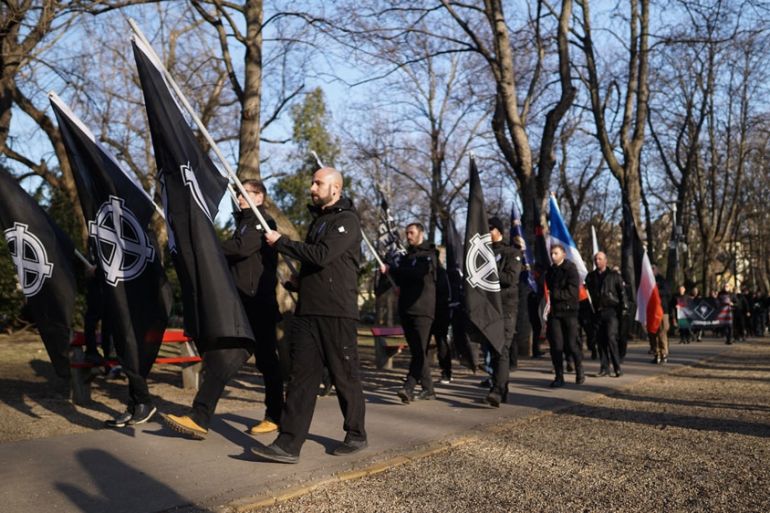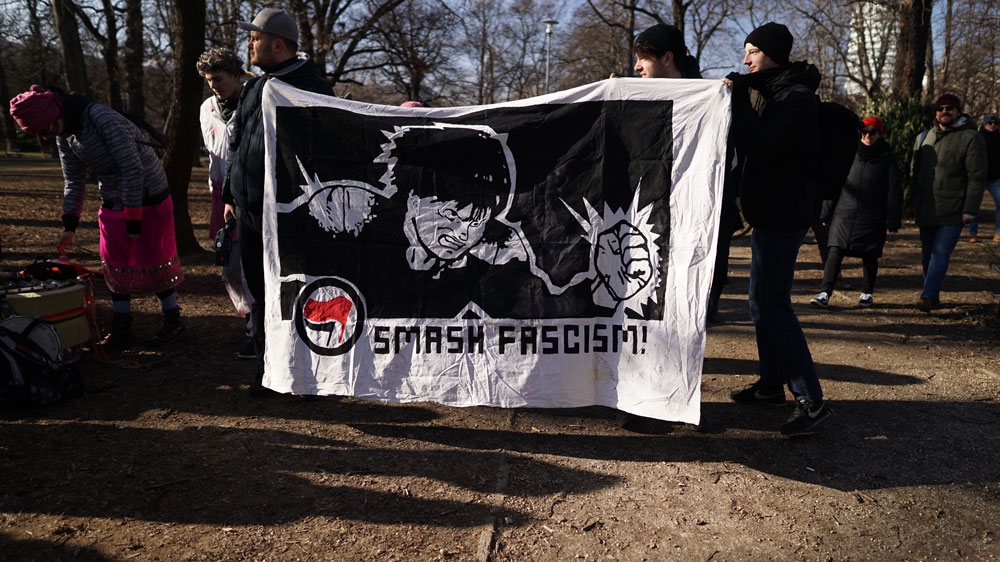Neo-Nazis from across Europe rally in Budapest
Some 600 far-right activists join ‘Day of Honour’ event, marking breakout by besieged Nazi forces in occupied Hungary.

Budapest, Hungary – While the rest of Europe commemorates 75 years of being freed from the scourge of Adolf Hitler, an estimated 600 neo-Nazis from across the continent met up in a Budapest park on Saturday to mourn.
They gathered in Hungary‘s capital for what they call the “Day of Honour”, commemorating an attempted breakout by besieged Nazi forces in 1945. Draped in black and carrying flags of their respective far-right movements from across Europe, they laid wreaths to honour the Nazis and their collaborators who they call “heroes”.
Keep reading
list of 4 items‘Feel less and less like playing’: Vinicius Jr in tears over racist abuse
‘Rendered invisible’: A wave of anti-Arab violence tests US hate crime laws
Germany bans far-right Austrian nationalist Martin Sellner from entry
“We have the same enemies today, like we did 75 years ago,” Matthias Deyda, from German far-right group Die Rechte, told the crowd on Saturday. “The enemy isn’t named Muller or Mayer. No, our enemy is named Rothschild or Goldman and Sachs.”
But the event did not pass without protest. Anti-fascist demonstrators organised two separate gatherings, attended by an estimated 300 counter-demonstrators who chanted, sounded sirens and beat on drums to try and drown out the far-right’s presence less than 100 metres (328 feet) away, protected by a police cordon.
After the commemoration, an estimated several thousand people began an overnight march from Budapest, following the almost 60km (37-mile) route of the attempted breakout to a village northwest of the city.
Organisers were also due to host a concert in the evening, at a location only made public late on Friday, featuring five bands that are well known in the neo-Nazi music scene.
The annual event is only promoted by the furthest fringes of the far right but its continued popularity has stirred fears that the far-right message is slowly seeping into the mainstream.

In February 1945, Nazi-allied Hungary was near capitulation, and the Soviet Red Army had already occupied most of Budapest. Nazi forces and their Hungarian collaborators were holed up in the hillsides overlooking the frozen Danube River, under siege and awaiting the inevitable.
In desperation, almost 30,000 of them, including civilians, tried to break through the Soviet siege to get to Nazi-controlled territory.
They failed. While a few hundred made it past Soviet lines, most were captured or killed. Budapest surrendered to the Soviets two days later.
Despite the plan’s failure, Hungary’s neo-Nazis have been commemorating it for more than 20 years, said Bulcsu Hunyadi, an expert on extremism at Hungarian think-tank Political Capital.
“The most serious, the most violent, the most aggressive kinds of people attend this event,” said Hunyadi. Still, no serious incidents were reported in the immediate aftermath of the event.
The commemoration has changed over the years, from attracting a few dozen neo-Nazis in the 2000s to more than 500 these days, including participants from across Europe.
Legio Hungaria, a Hungarian far-right group founded in 2018, organised this year’s events.
Despite its short history, the group has already made international headlines; in October 2018, after a march commemorating the 1956 Hungarian revolution, its members vandalised a Jewish community centre in Budapest.
Legio Hungaria insists that the Day of Honour has nothing to do with violence or illegality, with a spokesperson for the group telling Al Jazeera that they operate within the bounds of Hungarian law.
“Everything we do is legitimate,” the spokesperson said.
The group’s leader, Bela Incze, has a long history on the furthest fringes of Hungary’s far right. He once described himself as an “a-Semite” fighting for a world without Jews.
In 2010, he got the group he led at the time, the Sixty-Four Counties Youth Movement (HVIM, in Hungarian), excluded from official consultations on Hungary’s new constitution because he signed his email with a quote from Nazi collaborator Ferenc Szalasi.
In 2015, he worked as a parliamentary assistant to a member of the far-right Jobbik party, but his contract was terminated because he reportedly punched a police officer.
International attendees at this year’s Day of Honour included members of French, German, Bulgarian and Czech far-right groups, as well as members of Blood and Honour, the international neo-Nazi group officially banned in a number of countries, including Germany, Spain and Canada.
Hitler’s words
Budapest police tried to ban this year’s events, but a court overturned the attempted ban less than a week ago.
Several local leaders were left frustrated and decrying the “extremist organisations and individuals” set to march their streets.
“We urge [police] to do their utmost and ensure that marchers dressed in intimidating uniforms bearing authoritarian symbols do not disturb the peace of those who live here,” several Budapest local authorities wrote in a joint press release.
The Legio Hungaria spokesperson said: “We have every right to organise [the Day of Honour] … We will live with this right even if the whole world stands against us. This is the mentality that the heroes of the breakout taught us.”
But Hunyadi said the far-right message is spreading.
The march to the outskirts of Budapest, following the route of the attempted siege-breakers, had several thousand participants – not all were affiliated with the far right.
Hunyadi said they were ordinary Hungarians who have accepted the extreme rhetoric about the events in February 1945, that those who attempted to break the siege were “heroes” resisting communism.
Back in the park, Die Rechte’s Deyda concluded his speech in German with a quote. “For them, the mere pledge of ‘I believe’ is not enough, but rather the affirmation ‘I fight’.”
Deyda did not name the source, but they were Hitler’s words. They were originally spoken at the Sixth Nazi Party Congress in Nuremberg, Germany on September 8, 1934, shown in the Nazi propaganda film Triumph of the Will – and have now been repeated more than 80 years later by a German neo-Nazi near the centre of a capital in the heart of Europe.